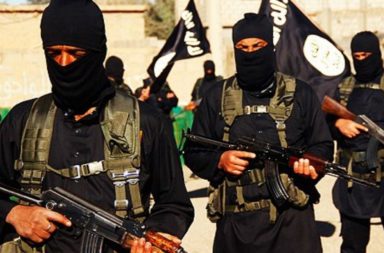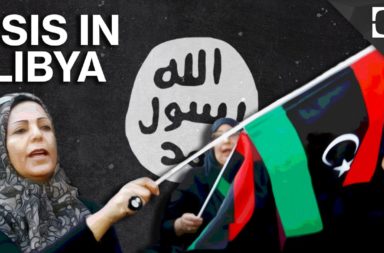Salman Abedi’s suicide bombing in Manchester on May 22 was immediately met with speculation that he may have been working with a jihadist group or network, perhaps even the Islamic State (IS). Sources linked to IS soon took credit for the attack. It then transpired that Abedi had recently travelled to Libya, and his father and brother have since been arrested in the Libyan capital, Tripoli.
- Thousands of militias popped up to carve out their own territory after Gadaffi was killed.
- Since the revolution in 2011, Libya has been a failed state.
- Sirte was the flashpoint for ISIS in Libya, until they lost control of it in 2016 and have now scattered elsewhere.
It’s still unclear whether Salman Abedi was indeed connected with IS or some other group, but his visit to Libya is ominous and telling. The country remains a haven for radical Islamist terror groups, among them IS – groups that won’t be rooted out any time soon.
It’s far from surprising that Libya is still ravaged by violence. The country has been a failing state since its revolution in 2011. It was long host to two rival governments: one based in Tripoli consisting of Islamic hardliners, and a more moderate one based in the eastern city of Tobruk, comprising moderates who were elected to the UN-backed House of Representatives in June 2014. In March 2016 the House of Representatives was able to move back to Tripoli as part of a plan to create an internationally recognised “unity government”, but the security situation is still incredibly weak.
Relatively free and fair elections have been held before, and further ones are set for 2018, but Libya is still is awash with militias and terrorist groups some of which date back to the fall of longtime dictator Muammar Gaddafi in 2011.
When Gaddafi was killed, thousands of militias popped up to carve out their own territory. They were joined by various other terrorist groups keen to make Libya their base. The country is ideal for their purposes: to this day, it has porous borders, no working unified security force, an abundance of loose weapons, and various things that can be smuggled to finance terrorist missions. Chief among these are oil and people; indeed, most of the terror groups’ financing actually comes from human smuggling, which reportedly generates up to US$323m for IS and other jihadist groups.
All over the place
IS controlled the coastal town of Sirte for more than a year, but lost control of it at the end of 2016. The group currently holds no territory, and its remaining fighters fled Sirte and have been moving around the country in small groups. These fugitive militants and sleeper cells are hard to locate and eliminate, and while theirs is not the most powerful group in Libya, they continue to wreak havoc, undermining the new Libyan government by cutting off power and water supplies.
IS is far from the only player. It faces competition from a number of Islamist extremist groups, most notably Ansar al-Sharia Libya (ASL) and the Abu Salim Martyrs Brigade (ASMB). ASL is a major jihadist group that emerged in 2011 during the Libyan civil war, and is based in the north-eastern city of Benghazi, where it mounted the infamous September 2012 attacks on the US consulate. But though ASL and IS are both extremist Salafist jihadist groups, they continue to have tensions with one another. ASL refused to swear allegiance to IS’s leader, Abu Bakr al-Baghdadi; instead, it has made connections with al-Qaeda affiliates in North Africa.
ASMB, meanwhile, is another Islamist militant group that aims to implement Sharia Law, specifically within the eastern Libyan town of Derna, where it imposed strict social codes. IS came to Derna in 2014 and started to take over much of ASMB’s resources; the groups clashed for months, and IS was eventually forced out. All three groups then came into direct conflict with one another in 2015 when IS assassinated ASMB leader Salim Derby, a member of the Mujahedeen Shura Council, which included both AMB and ASL.
Both ASMB and ASL’s appeal is mostly local. ASL has focused on charity work, enticing the local population to join it by providing basic services. ASMB, meanwhile, was one of the first groups to take up arms in the revolution, and many Libyans gave it credit for restoring order in the areas where it operated.
In contrast, IS is not in the business of providing public goods; it is instead focused on luring international recruits, preferring to use its Libyan base and resources to plot and stage attacks on the West. Though it originally relied on Libyan recruits who came home from fighting in Iraq and Syria, it is now recruiting foreign forces from Egypt, Tunisia, Yemen, Sudan, and most notably, Europe. Joining IS’s Libyan affiliate is appealing to European wannabe fighters because they can travel to Libya by boat and avoid government detection.
And so the fight goes on. All the while, an alarmingly large number of Britons are still travelling to the Middle East and North Africa to join jihadist organisations. More than 850 are known to have gone, most of them under the age of 30. Groups such as those in Libya have a strong social media presence, and they are good at appealing to foreign fighters who want to join a cause and find a sense of belonging. IS and its ilk may be losing ground, but their appeal to Western would-be jihadists endures.




